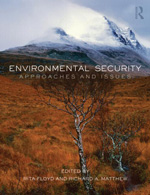-
Environmental Security: Approaches and Issues (Book Preview)
May 23, 2013 By Rita Floyd
A little over a decade ago when I first became interested in the subject of environmental security, it took me ages to understand what I have since been eager to stress: environmental security is not a concept but rather a debate.
 As an undergraduate at the University of Portsmouth, there were very few textbooks on security studies in general, and certainly none that included sections on the environment (as does, for example, Columba Peoples and Nick Vaughn Williams’ Critical Security Studies: An Introduction, published in 2010). “Environmental security studies,” as my co-editor Richard A. Matthew and I chose to call it in this volume, had the important but by now dated volume, Contested Grounds: Security and Conflict in the New Environmental Politics, which set out some of the different approaches to environmental security. And that was followed a little later by edited collections such as Environmental Conflict and Violent Environments and the brilliant monographs, The Meaning of Environmental Security, by Jon Barnett, and Environmental Security, by Simon Dalby. But, with the exception of the Wilson Center’s Environmental Change and Security Program annual reports and to some extent Contested Grounds, these books considered environmental security from only one angle or another and thus did not provide a comprehensive overview of debate within the field.
As an undergraduate at the University of Portsmouth, there were very few textbooks on security studies in general, and certainly none that included sections on the environment (as does, for example, Columba Peoples and Nick Vaughn Williams’ Critical Security Studies: An Introduction, published in 2010). “Environmental security studies,” as my co-editor Richard A. Matthew and I chose to call it in this volume, had the important but by now dated volume, Contested Grounds: Security and Conflict in the New Environmental Politics, which set out some of the different approaches to environmental security. And that was followed a little later by edited collections such as Environmental Conflict and Violent Environments and the brilliant monographs, The Meaning of Environmental Security, by Jon Barnett, and Environmental Security, by Simon Dalby. But, with the exception of the Wilson Center’s Environmental Change and Security Program annual reports and to some extent Contested Grounds, these books considered environmental security from only one angle or another and thus did not provide a comprehensive overview of debate within the field.Consequently for someone new to the topic, as I was then, and with little, though well-intended, guidance from my mentors (environmental security still remains surprisingly understudied in the UK), it was hard to understand environmental security as a field of enquiry and not as one coherent approach. But this understanding of environmental security is wrong; the field is full of analytical diversity.
Continued Debate a Healthy Sign
Consider, for example, the on-going debate over whether natural resource scarcity or abundance is more closely related to conflict or cooperation.
Some resource scarcity and conflict scholars hold that environmental scarcity has damaging social consequences (constrained economic activity, declines in agricultural yields, social segmentation, etc.), which in turn can lead to violent conflict. Others argue that under certain circumstances it is abundance of non-renewable resources, such as precious metals, diamonds, and oil, that can lead to violent conflict and consequently widespread poverty and human insecurity. These arguments, in turn, have been challenged by scholars who contend that, rather than conflict, resource tensions and pressures tend to generate innovation and cooperation.
“Environmental security” as a term has been used as a platform for moving away from traditional understandings of national security and hence linked to agendas such as human security (e.g., the International Human Dimensions Program’s Global Environmental Change and Human Security Project). It has also generated fierce critiques; for example, Dan Deudney famously dismissed environmental stress and degradation as outside the realm of national security because only intentional behavior structures the field of security threats.
Environmental security has also proven a remarkably creative paradigm, generating new interdisciplinary insights by, for example, reaching into the natural disasters literature to study vulnerability and adaptation, epidemiology to look at the rise of zoonotic infectious disease, and earth systems science to use climate science as a principal source of data. In view of the diversity of work environmental security has overlapped with, it is perhaps inevitable that the meaning of the term has remained unsettled and often contested.
Climate Security Brings Renewed Interest
Today – after a short decline during the height of the war on terror – interest in environmental security studies is stronger than ever, largely because of the widespread acceptance of anthropogenic global climate change and its associated consequences for national, international, human, and biosphere security.
The fragmentation of environmental security studies literature, however, creates a risk that those now entering the field may overlook established tenets and lines of thought, or at the very least, not regard them as natural entry points to the climate security conundrum. This is worrying because more than two decades of research have delivered some tangible results that would make an ideal starting point for climate security research.
Moreover, as a teacher of environmental security, the fragmentation of the field is particularly frustrating as within the remit of a course there is simply no time to leaf through hundreds of pages of journal back issues or get students to read all of the above mentioned texts and edited collections.
Capturing Complexity
These issues – new interest in the subject through climate change, fragmentation of the existing literature, and the lack of a comprehensive look at the field – are the motivation behind my new co-edited book, Environmental Security: Approaches and Issues.
Richard Matthew on why responsive peacebuilding should include the environment This book has been prepared to provide an inclusive overview of environmental security studies. Myself and Richard both regard diversity as a strength of the field and a necessary basis for intellectual and policy innovation. We see no value in adopting a reductionist stance, preferring instead a literature that speaks to a number of academic disciplines, including security studies, geography, and the environmental sciences. The complex stresses of the 21st century – from global and local economic crises to climate change and unprecedented rates of urbanization – do not lend themselves to unified and parsimonious forms of analysis. Today, competing approaches provide different but important insights into a world of dense relationships, crumbling institutions, dramatic transformations, and high levels of uncertainty.
By collecting the most influential approaches to environmental security in a single volume, Environmental Security aims to offer a rich overview and a valuable resource for those entering the field. In addition to presenting various intellectual approaches to environmental security (including a new framework for understanding environmental security studies), the volume includes chapters on the most pertinent issues unfolding at the intersection of security and the natural environment – namely, water, conservation, food, sustainable development, demography, energy, and climate change. For example, Patrick MacQuarrie and Aaron T. Wolf discuss the likelihood of water wars in many of the world’s most important water sheds; Jennifer Sciubba, Carolyn Lamere, and Geoffrey D. Dabelko discuss the role of population in national security, applying Barry Buzan et al.’s security sector analysis; and Adam Simpson offers a novel critical approach to energy security, moving away from state centrism.
This book also brings together other leading scholars whose work has shaped environmental security studies for years, including Simon Dalby, Dennis Pirages, Michael Watts, Saleem H. Ali, , Bishnu Raj Upreti, and Alexander Carius, as well as a number of up-and-coming younger scholars including Tom Deligiannis, Achim Maas, Nicole Detraz, and Bryan McDonald.
My hope is that Environmental Security will offer instructors a one-stop shop for the theoretical and empirical complexities involved in this subject, while making it easier for students new and existing to navigate the complex literature and move on to develop their own ideas and research projects from there.
As I argue in the book, environmental security is not only a worthy field of inquiry on its own, but has much to contribute to security studies as a whole. Research from within environmental security studies has implications for how we understand the nature of threats, the condition of security, the practice of security, and pathways to unmaking emergency politics as well as the ethics of security and securitization. This book aims to put environmental security studies firmly on the radar of security scholars and practitioners everywhere.
Rita Floyd is the co-editor of Environmental Security: Approaches and Issues and a Birmingham Fellow in Conflict and Security at the Department of Political Science and International Studies at the University of Birmingham, UK.
Photo Credit: U.S. Air Force airmen participate in training in Germany, courtesy of Kenny Holston/U.S. Air Force.
 A Publication of the Stimson Center.
A Publication of the Stimson Center.




